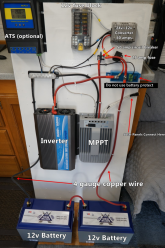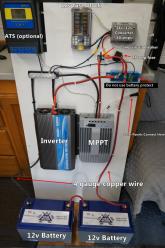Alberta Off-Grid
New Member
- Joined
- Feb 21, 2021
- Messages
- 6
I'm new to solar and I live off-grid... I've chosen the following set-up :
2000Watt, 24v Off-Grid Solar Setup (with the exact components on Will's site)
I've purchased two SOK 12v 206Ah batteries. Do all the 40Amps fuse, charge controller, Inverter stay the same for 206Ah as opposed to the 100Ah on Will's set-up?
Also, I'm running my generator every second day (for laundry and bigger appliances) and I would love to top up the batteries when the generator is running. Would a simple 12 volt battery charger from Walmart or Canadian Tire work? What's the best and simplest battery charger for my two SOK Lithium Batteries.
Where do I connect the charger, can I connect directly to the battery terminals?
Thanks, this is all new to me...
2000Watt, 24v Off-Grid Solar Setup (with the exact components on Will's site)
I've purchased two SOK 12v 206Ah batteries. Do all the 40Amps fuse, charge controller, Inverter stay the same for 206Ah as opposed to the 100Ah on Will's set-up?
Also, I'm running my generator every second day (for laundry and bigger appliances) and I would love to top up the batteries when the generator is running. Would a simple 12 volt battery charger from Walmart or Canadian Tire work? What's the best and simplest battery charger for my two SOK Lithium Batteries.
Where do I connect the charger, can I connect directly to the battery terminals?
Thanks, this is all new to me...





